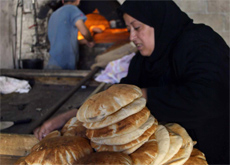By Abdel Hai Mohamad
Abu Dhabi's food imports increased considerably during the past two years as the cultivated area contracted and the level of self-sufficiency in several commodities and livestock went down, the emirate's Department of Planning and Economy has revealed.
The department yesterday called for a strategic plan to achieve food security through an increase in agricultural investment outside the UAE, especially in Sudan, and schemes to encourage nationals to cultivate land inside the emirate.
Alaa el-Din Hassan Moussa, a senior economic researcher at the department, said Abu Dhabi relied on imports for 85 per cent of its food needs.
"It also depends on imports in full for basic food commodities such as wheat, corn, sugar, flour and vegetable oils," he said at a forum organised by the department on the role of the agriculture sector in achieving food security in Abu Dhabi.
"And 91 per cent of commodities whose prices rose last year were imports. Meanwhile, 66 per cent of commodities whose prices were stable were locally produced ones."
He said Abu Dhabi's imports of agricultural commodities grew by 19 per cent a year and imports last year totalled Dh29.4 billion compared with Dh11bn in 2002. Last year the value of the emirate's agricultural exports stood at Dh4.5 million.
"The contribution of the agriculture sector to the emirate's gross domestic product fell to 0.8 per cent last year from 3.5 per cent in 2003. Also the cultivated area was reduced by 6.2 per cent over the same period.











